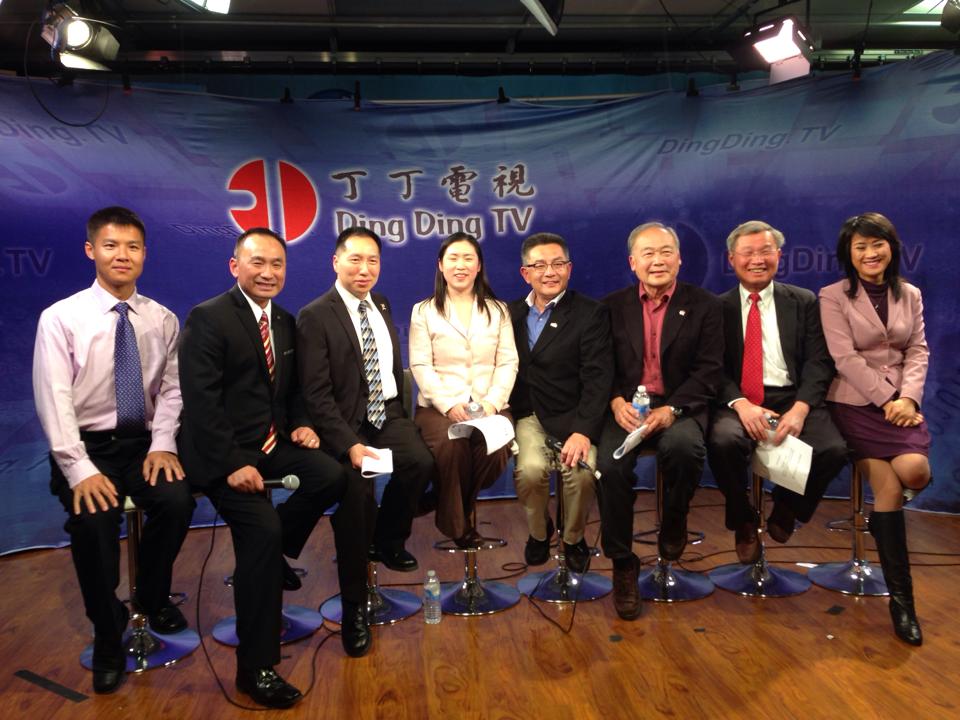By David Li, bostonese.com (with contributions from members of SVCA)
San Francisco, March 27, 2014, — On the same day when state Senator Leland Yee was arrested by FBI, three Asian American candidates George Yang, Kansen Chu, Peter Kuo, and Barry Chang appeared on DingDing TV Wednesday night. Senator Leland Yee voted for Senate Constition Amendment 5(SCA-5) on Jan. 30 along with all Democratic senators on Jan. 30, 2014. But, he later requested the bill to be returned to the Senate after protests by Asian American residents erupted across the state.

Peter Kuo(second from left), George Yang(third from left), Kansen Chu(fourth from right) and Barry Chang(second from right) with host Diana Ding (right). (from SVCA’s Facebook page)
|
|
The discussions focused on SCA-5. Eva Lu and Shuohao Zhang of Silicon Valley Chinese Association (SVCA) and Joel Wong of APAPA were the other guests. Diana Ding hosted the discussions.
The main point is that: SCA-5 does too much harm to millions of people, and at best cause mismatch to about a thousand freshmen of preferred races each year. The following are some of the key points.
1. To solve the root problems, California shall fix the failure of K-12 and increase funding on education. These solutions improve equality for millions of students. Each year, UC’s preferential treatment for students who are socioeconomically disadvantaged already admitted thousands of freshmen with comparatively lower test scores.
SCA5 creates racial conflicts and distract from the right solutions for equality.
2. SCA-5’s racial discrimination attacks the basic dignity and human rights of millions of people born with skin colors. Human dignity is more important than other interests such as distribution of tax money.
3. SCA-5 potentially could draw about an additional thousand freshmen of preferred races from other UC campuses to UC Berkeley or UCLA each year, and deny a thousand students with better objective merits. These freshmen would have higher probability of mismatch to the much tougher academic vigor and not graduate.
Only personal/family dedication and good K-12 education truly prepare students to succeed in UC Berkeley or UCLA, especially in STEM fields.
4. In community colleges, CSU, and other UC campuses, hundred of thousands of freshmen already represent composition of high school graduates in California. The numbers of Latino and Black students have risen dramatically across UC campuses since the passage of Proposition 209.
5. One key argument for Affirmative Action for minorities is the compensation argument. Minority Asian Americans historically were discriminated. There is no ground for SCA5 to further discriminate minority Asian Americans. Contrary to Affirmative Action for minority, SCA5 is for population majority to impose tyranny on true minorities.
In response to the news of Senator Leland Yee, Peter Kuo, candidate for state Senate District 10 released the following statement:
“Like many others today, I am disappointed to hear the news about Senator Yee. As a fellow Asian American and despite our political and philosophical differences, I admire him for his service to our state and to his district. For his sake, his family’s sake and the people of his district, I hope the news turns out to be inaccurate and we may soon be able to return to having an honest discussion about the future of California and what it will take to get this great state back on track. The people of California want and deserve a transparent government. They want to know that their elected officials are working on their behalf to stimulate the economy, put hard-working Californians back to work, reinvigorate are failing school system and is focused on solving our state’s devastating energy crisis. These are the issues of today and deserve our full attention.”
DingDing TV is the first Chinese American Internet TV, Silicon Valley Innovation Channel, Internet video content producer and distributor. DingDing TV is devoted to bringing out and enhancing the understanding by viewers of its interdependent global realities. DingDing TV is positioned as a hub, bridge and platform for US-China business relations. For more information, please visit www.dingding.tv.
|
|